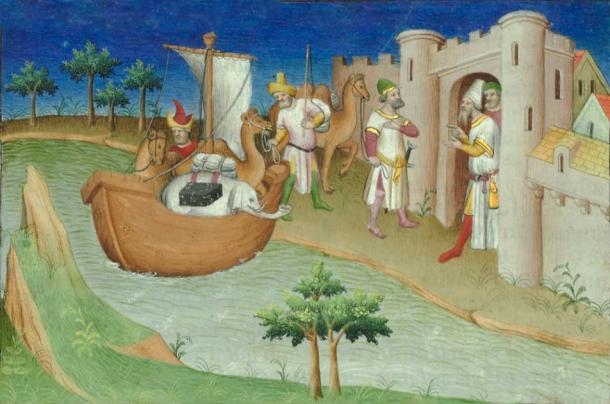
The World Only Knows About Marco Polo Because of His Ghostwriter Prison Cell Mate
Marco Polo may be a household name, but few know that his famous literary masterpiece, The Travels of Marco Polo, was not only written while he was in prison, but was penned by somebody else. Marco Polo’s tale of adventure in the Far East became a bestseller when it was published around 1300, inspiring generations of explorers, including Christopher Columbus who kept an annotated copy amongst his personal belongings.
The bestselling biography / autobiography / travelogue recounted the experiences of Marco Polo during a 24-year voyage alongside his father and uncle, Niccolò and Maffeo Polo. Originally from a family of well-travelled merchants, Marco Polo left Venice at just 17 years old and returned at 41, passing through countries including Turkey, Iran, Afghanistan, Pakistan, Kashmir and China between 1271 and 1295. Marco Polo was even employed at the court of Mongolian emperor Kublai Khan for 17 years.
The story of Marco Polo’s travels included a plethora of useful information for merchants at a time when few Christians had ever travelled into the Far East, let alone to China. In fact, “the wealth of information Marco Polo provided on China and its surrounding lands was unprecedented in its time,” explained National Geographic.

Marco Polo with elephants and camels arriving at Hormuz on the Gulf of Persia from India, in a manuscript of The Travels of Marco Polo at the Bibliothèque nationale in Paris. (Public domain)
Nevertheless, the book was actually written by Rustichello of Pisa, Polo’s cellmate when he was captured and imprisoned as a prisoner of war during a battle between Venice and Genoa in 1298. Some historians have claimed that the entire book is a fabrication, made up of secondhand accounts heard from others. Others believe that Marco Polo never existed at all and was a figment of Rustichello’s active imagination.
Nonetheless, the majority believe that the book is mostly true, with a few embellishments thrown in to improve sales, such as accounts of unicorns (possibly rhinos), pasta growing on trees and even dog-headed humans. This was before the invention of the printing press, and so the book was copied by hand, which didn’t help much in avoiding mistakes, well-meaning alteration and stark differences between copies and translations.
The Travels of Marco Polo, also known as Il milione (in allusion to Polo’s nickname Il milione suggesting a man who invented a million tall tales), is not the only literary masterpiece to have been written in jail. Sir Thomas Malory wrote Le Morte d’Arthur, a retelling of the story of King Arthur, while imprisoned at London’s Newgate Prison. Miguel de Cervantes claimed that the prologue to Don Quixote was “begotten in prison.” Whether or not this is true is another matter.
Top image: Mosaic of Marco Polo from the Municipal Palace of Genoa. Source: Public domain
By Cecilia Bogaard
















Comments
Yup, for the same reasons mentioned there are inaccuracies. However, much was accurate. For this most people believe it true. I have read it. Truth is always stranger than fiction. Don't be satisfied with less, read it for your self.